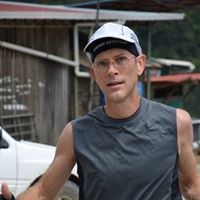By Jeff Brumley
Eddy Ruble used his Facebook status to share a long-time dream with friends Tuesday.
“I’ve always dreamed of visiting Nepal, but not under the circumstances to which I am to arrive to today,” he wrote.
The circumstances are the death and devastation wrought by Saturday’s magnitude 7.9 earthquake in the mountainous nation most famous as the home of Mount Everest.
Ruble serves as field personnel for the Cooperative Baptist Fellowship in Southeast Asia. It was one of his many roles in the region — disaster response — that earned him a sudden, unplanned trip to Nepal.

Baptist News Global reached Ruble through Facebook Messenger, where he answered questions about the task ahead of him and other responders eager to help Nepal recover from the quake, which has claimed at least 4,600 lives.
“By all accounts. Nepal is a country blanketed by extreme poverty, harsh and rugged geographic topography, and poor construction — all making for this to be a massively devastating situation in the immediate and long-term recovery,” he said.
Here is more of what Ruble had to say early Tuesday morning via Messenger.
Where are you now, as you write this?
I am now on a flight from Penang to Bangkok with a one-hour transit before our scheduled flight to Kathmandu today. Fingers crossed that we will depart and land as scheduled.
How hard was it, or will it be, to get into Nepal? What are the obstacles to getting there?
Sunday early afternoon I made the decision to try travel to Kathmandu with two other mission workers based in Penang where I live. One, Gill Nash, has lived in Nepal for nine years and is fluent in the language. We got three of the last four seats available on Thai Air for April 28th. We have tickets, but it still remains to be seen if we can actually land in Kathmandu today. Word is yesterday’s Thai flight was diverted to Calcutta due to weather and priority given to military and official aid flights. Kathmandu’s airport is very small, one runway and located in a valley.
Have you been to Nepal before, and if so, when and in what capacity?
I have never been to Nepal before. I have spent most of my life in Indonesia (25 years) and the past seven in Malaysia. I first gained experience in disaster response during the Asian tsunami of 2004 — I was living in central Sumatra at the time and worked in CBF’s response in Aceh for the next five years. I assisted in the Japan Tohoku 2011 earthquake/tsunami assessment and Baptist response and assistance to our Japanese Baptist partners. Last year I assisted in the Typhoon Haiyan response in the Philippines, networking with Asia Pacific Baptist Aid and Transform Aid Australia along with BWAid coordinated efforts there.
Will you be partnering with any other agencies or missionaries from CBF, or with other Baptist or non-Baptist groups?
Yes. CBF does not have field personnel in Nepal. CBF does have good, on-going working relationships with global Baptist partners. In this Nepal effort, I will … work directly with UMN (United Mission to Nepal) as the implementing partner on the ground in Nepal. This will be a tremendous help to be able to work under the coordination of an organization which is already well established in Nepal. In any major disaster like this, partnering, coordinating, and sharing information is an essential element of success. The goal is to help meet the needs of those suffering the most and with great physical and psycho-social needs. This network of Baptists (BWAid, APBAid, BMS, TAI, CBF, etc.) will coordinated our efforts to maximize our capacity and impact.
What will be your first order of business once you arrive in Nepal?
The first order of business will be to get a brief survey of the situation, meet local partners to hear firsthand the needs and situation both in Kathmandu and especially from the more rural outlying areas closer to the epicenter, then get to work as needed, where needed. Things evolve and change by the day.
How important is the ongoing media coverage to relief efforts in Nepal?
Publicity and media have a major impact on the amount of funding which comes into NGOs and mission agencies — as long as the disaster is in the news and gaining coverage, readers can feel and sympathize with the victims and survivors. I find sending out stories and current situation reports is one of the most helpful things in the early phase of assessment and response. CBF has issued an appeal for funding and has opened a specific channel for Nepal relief funds.
Related story:
